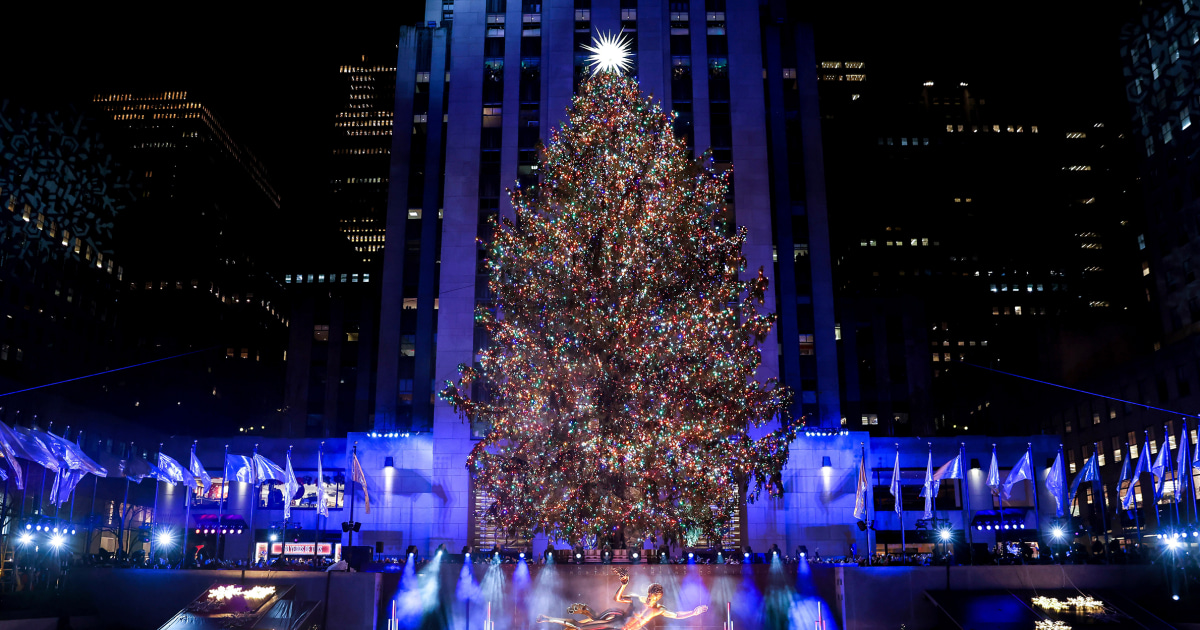Answers to 25 big questions about the Rockefeller Center Christmas tree
This tree could be the Rockefeller Center Christmas tree!
Many have spotted a towering tree — whether in their community, down their block or even on their property — that seemed large enough, full enough, and majestic enough to serve as the world’s most high-profile Christmas tree for the holiday season.
Like my neighbor’s tree, a 75-foot Norway spruce on Long Island, New York that soars over both houses and has long been a source of shade, pinecones and Rockefeller wonder.

But just how tall does the Rockefeller Center Christmas tree actually have to be? How full? How majestic?
To get to the root of these questions, I had to bark up the right tree. So, I took photos and videos of the tree and showed them to Erik Pauze, the head gardener of Rockefeller Center who scouts areas near and far to select the Rockefeller Center Christmas tree each year.
“It looks like a beautiful tree that needs a visit,” Pauze said while examining the photos in the 30 Rock lobby. “I’ll have to go look at that one day.”
But how would they even get the tree off the property without tearing down power wires, wiping out mailboxes and angering the rest of the neighbors?
Pauze helped answer those questions and many more — like how does that 900-pound star stay atop the tree?! — ahead of Wednesday’s tree lighting.
The strands of lights wrapped around the Rockefeller Center Christmas tree could stretch from Rockefeller Center to beyond the World Trade Center.
There are over 50,000 multi-colored LED lights on the Rockefeller Center Christmas tree, connected by approximately five miles worth of wire.
Tree lights not working properly are as synonymous with Christmas as Santa Claus.
When one light goes out, they all go out. So, on the most famous Christmas tree in the world, when one light goes out, do all 50,000 go out?
“We’ve got some great LED lights so that doesn’t happen,” Pauze said.
Untangling Christmas lights that have been in knots from January to November is one of the great joys of the holiday season. And that’s for a tree that’s only seven-feet tall.
So, when the 80-foot Rockefeller Center Christmas tree comes down each year, where and how are the 50,000 lights and five miles of wiring stored? Is there a closet in 30 Rock with a gigantic ball of rolled up Christmas lights? Nope.
“The lights are new every year,” Pauze said.
In recent years after the tree has been cut down, Pauze said some of the bulbs from the lights have been turned into ornaments by Rockefeller Center for the following holiday season.
As for the tree’s 900-pound crystal star and the plaza’s famed angel statues, they go to a climate-controlled storage warehouse.
The modern-day Rockefeller Center Christmas trees typically are 75 feet and up. This year’s tree from Vestal, New York is approximately 80 feet tall and 43 feet in diameter. It weighs about 12 tons.
One tree in Rockefeller Center history hit triple digits.
That tree was from Killingworth, Connecticut in 1999 and stood 100-feet tall.
The first tree went up before the building did.
The Rockefeller Center Christmas tree stands alongside 30 Rockefeller Plaza, a famed cultural landmark better known as 30 Rock. While the building was being constructed in 1931, construction workers put up a Christmas tree at the site. The balsam fir stood roughly 20 feet tall and was decorated with handmade garland made by the workers’ families, becoming the first Rockefeller Center Christmas tree.

The first formal Rockefeller Center Christmas tree lighting was in 1933, eight months after the opening of 30 Rock, then known as RCA Building. The tree was lit on national television for the first time in 1951 on the “Kate Smith Show.”
If there’s a large spruce in front of your house, you might get a knock on the door one day from Rockefeller Center’s head gardener Erik Pauze. Here's how he got the job .
Pauze has picked each of the last 30-plus Rockefeller Center Christmas trees, selecting trees that were nominated or that he spotted while driving and asked the homeowner if they’d donate the tree to Rockefeller Center for the holiday season.
“Sometimes it takes a little convincing, sometimes they just want to be talked through it,” Pauze said. “After that, there’s usually a little family discussion, and then I’m up there watering the tree and feeding it.”
Yes! The tree could go straight from your property to Rockefeller Center if it meets certain requirements. The most obvious being that the tree must be large, full and look similar to the one in your living room.
“You gotta make sure you have a perfect tree, the color, the shape,” Pauze said. “But also, what are the logistics? I always run through my mind how I’m going to get the tree out of there.”
Easy access to the tree on the property is a plus, although Pauze said one year a tree set in the backyard was lifted over the house by crane. Easy access from the property to a major highway also helps since it’s challenging for a truck to drive down winding side streets while trailering an 80-foot tree.
Millions. As in millions of smiles, selfies and memories for those who come see the tree that one stood in their yard.
“We feel incredibly lucky for the opportunity to be of service to millions of people,” said Jackie McGinley, who, along with her husband Matt, donated the 2023 tree. “How often in one’s lifetime do you get to do something that will bring millions of people joy?”
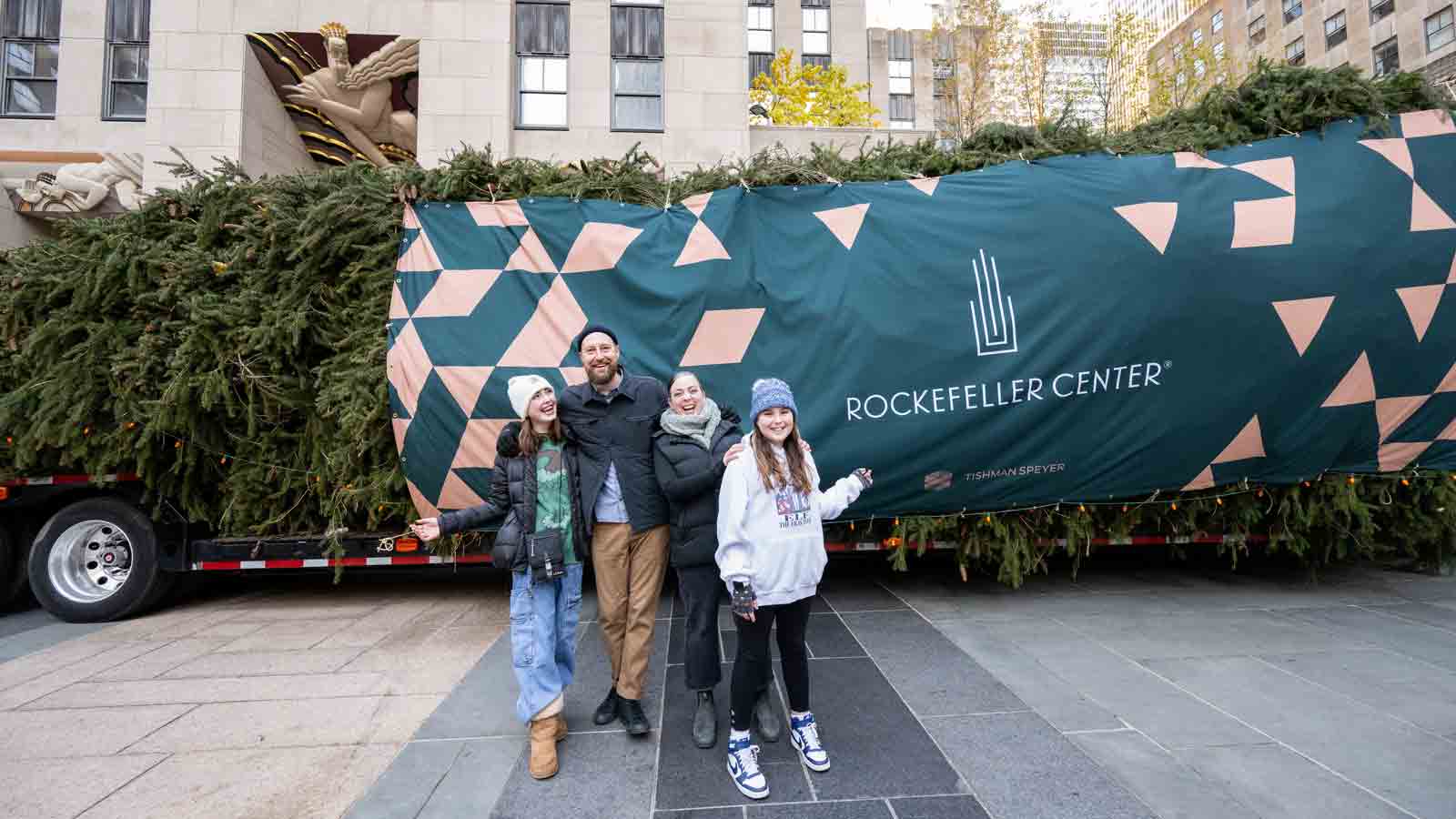
The Rockefeller Center Christmas tree is donated each year. Many of the trees selected are often reaching their maximum height and outgrowing their property, becoming a potential wind hazard. The tree that is cut down and brought to Rockefeller Center is replaced by a new tree, or multiple trees, planted on the donor’s property.
One tree needed a passport to get to Rockefeller Center.
In 1966, Canada donated the tree in honor of the Centennial of its Confederation, making it the first Rockefeller Center Christmas tree to come from outside the United States.
“If you’ve got a tree in Hawaii that we can go check out, then let’s go get it,” Pauze said. “If we got a good tree and the family is willing to donate it, it’s a great story.”
This year’s tree came from Vestal, New York — a 190-mile trip from Rockefeller Center that normally takes about three hours during a traditional commute but took a day-and-a-half while hauling a 12-ton tree.
What, you’ve never tied a Christmas tree to the roof of a car before?!
It’s kind of similar to that, but on a much grander scale and in an “Only in New York” type of way.
There’s no other place where an 80-foot Christmas tree is hauled across a bridge and into the heart of one of the busiest cities in the world. But that’s the annual journey of the Rockefeller Center Christmas tree.
Preparation begins long in advance of the cut, with Pauze making regular trips to the property to feed and water the tree.
“This year, when it was really warm out, I was up there once a week giving it 800 to 1000 gallons of compost tea and water,” Pauze said.
The tree is climbed by workers multiple times to take measurements and locate the areas on the tree where cables will be connected when in place at Rockefeller Center.
While the tree is still standing, workers at the property tie up the branches over the course of about six days so the tree is secure for the cut and the drive to Manhattan. A day or so later, the workers return to lay crane mats on the property, attach the crane to the tree and put counterweights in place. The tree is cut down by chainsaw, lowered onto a flatbed truck by crane and strapped down.
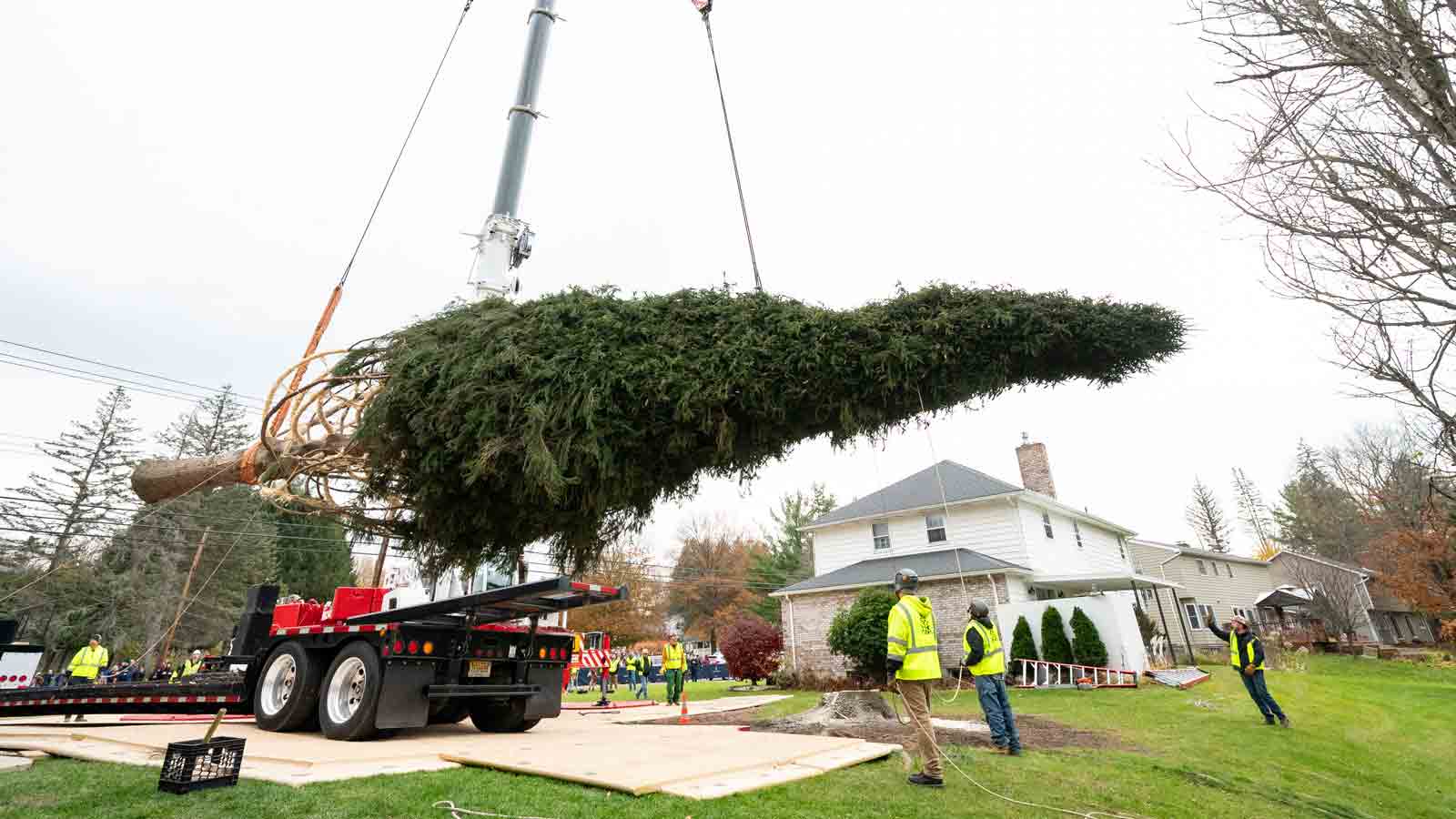
Rockefeller Center banners are then placed on each side of the tree, and the journey begins with the help of a police escort and some closed streets along the way.
It passes through the seven levels of the candy cane forest, through the sea of swirly-twirly gumdrops, then it goes through the Lincoln Tunnel.
No, there aren’t any tunnels or candy cane forests on the tree’s route, but it has arrived by land, air and sea. In 1997, it traveled by barge from Stony Point, New York and in 1998 it was flown in from Richfield, Ohio on the world’s largest transport plane.
When within driving distance, the tree’s journey to Rockefeller Center is determined by which state and direction the tree is coming from, while also navigating around construction or other potential roadblocks.
“It depends on if we’re coming over the George Washington Bridge, the Tappan Zee Bridge, down I-95 from Connecticut,” said Pauze, who from the truck’s passenger seat acts as the equivalent of the fire department’s “officer of the truck.”
The truck typically makes its way to one of Manhattan’s widest southbound avenues before turning onto 49th street and making its way into Rockefeller Plaza.
“It sounds like we’re making a nice joyride, but it’s 12 tons going down the road,” Pauze said. “We want to make sure everybody gets there safely.”
Luckily, Christmas is only once a year because it costs a lot more than a car’s toll.
“Good thing I don’t have to pay that toll. That’s somebody’s else’s job,” Pauze said with a laugh. “I don’t think there’s enough room on my credit card for that.”
And don’t forget about New York City’s congestion pricing!
It’s just like carrying a Christmas tree from the roof of the car to the living room...only with a much larger tree while using heavy machinery in front of many spectators.
Putting the tree up is essentially the same process as taking it down, only in reverse. A crane lifts the tree off the truck, initially holding it horizontally a few feet off the ground. A hole is then drilled in the bottom of the trunk and a tree spike is inserted.
The crane then raises the tree vertically and workers help guide the spike into the center of the tree stand, where it latches onto angle iron that helps to prevent the tree from swaying. Cables that are anchored to various locations in the plaza are connected to the tree via the bracing that was installed on the trunk months prior during the initial climbs.
“So, when it gets here, we know exactly where those cables are going,” Pauze said. “As the tree sits up in the stand and spins into position, they are right where they’re supposed to be.”
The tree is then surrounded with levels of scaffolding so workers can prepare it for the tree lighting.
No Christmas tree is complete until it’s topped with a star. Even if it literally weighs a ton.
The Rockefeller Center Christmas tree’s Swarovski star features 70 spikes covered in three million crystals. With a diameter stretching over nine feet, the star weighs approximately 900 pounds.
Not even the grandest Christmas treetop in the world is built to hold a 900-pound star.
So, the star is held not by the Rockefeller Center Christmas tree itself, but by a pipe that is inserted down the tree’s center. A crane hoists the pipe into the tree and workers secure it to the trunk using cribbing.
“The crane then lifts up the star, puts it into the pipe, and we make sure it looks beautiful,” Pauze said.
When the tree is first set up at Rockefeller Center it takes about 90 gallons of water, Pauze said. That amount gradually decreases each week. One of the Rockefeller Center gardeners waters it the same way you water landscaping at home: with a hose.
Hey, every Christmas tree needs a little filler here and there.
“We use a lot of camouflage branches to hide the wires and cables that we put in there,” Pauze said.
When workers climb the tree before it is cut down, they make sure there’s no wildlife living among its branches, Pauze said.
In 2020, an owl made the roughly 170-mile trip from Oneonta to Rockefeller Center in the 75-foot spruce that was transported. The tiny owl was discovered by a worker after the tree was installed and later treated at a wildlife rehabilitation center. The owl — which was named Rockefeller and called Rocky for short — was released back into the wild .
There is only one day each year that the lights on the Rockefeller Center Christmas tree stay lit for 24 hours. If you guessed Christmas Day, you are correct.
The lights on this year’s tree will be lit daily from 5 a.m. to midnight, except for New Year’s Even when the lights are shut off at 9 p.m. The tree is scheduled to be taken down on Jan. 13 at 10 p.m.
Are there hundreds of extension cords that need to be plugged in? Is there a huge switch on the wall somewhere?
The lighting is actually set on a timer, but there is some manual labor involved in the daily — and somewhat secretive — process that Pauze said involves a panel in the Rockefeller Center sub basement.
“We make sure it goes on and off each day correctly,” he said.
As for the energy used while keeping the lights on, the switch to LED lights in 2007 reduced consumption from 3,510 kwH to 1,297 kwH per day, saving as much energy as a family would use in a month in a 2,000-square-foot home.
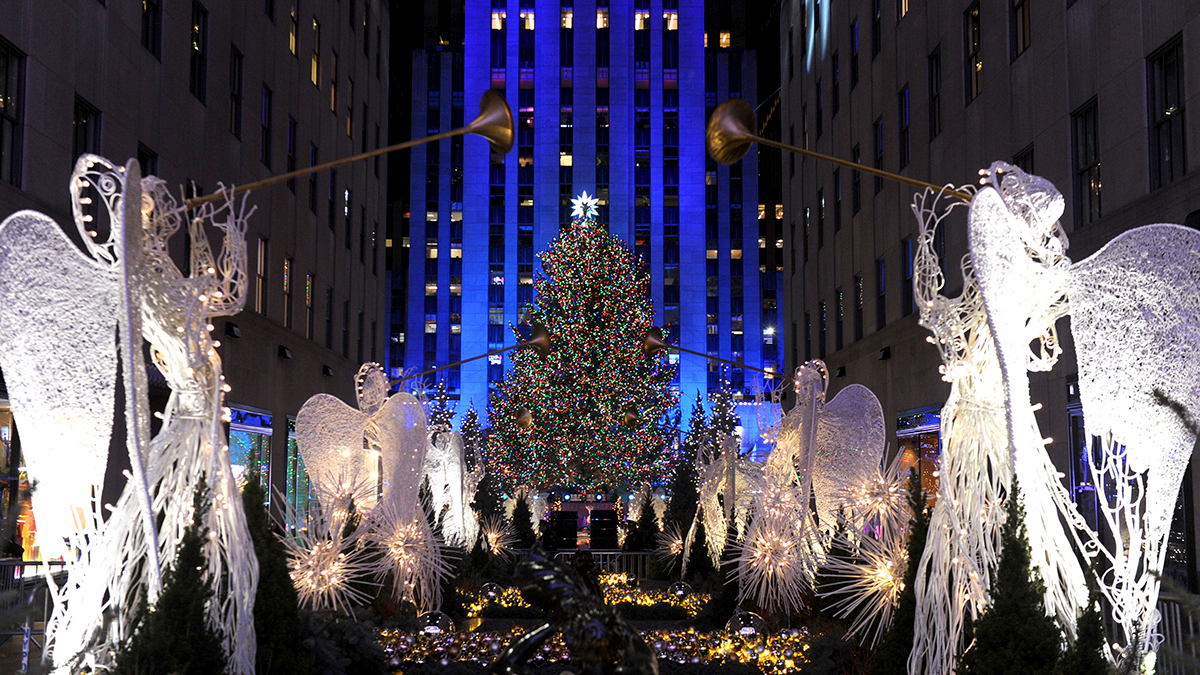
As the saying goes, be on the side of the angels.
Channel Gardens in Rockefeller Plaza is lined with 12 winged, robed and haloed angels, with each holding a six-foot-long trumpet. The eight-foot-tall statues, made of wire in 1955, have become an iconic symbol of Rockefeller Center’s holiday décor. Situated between the angels’ trumpets is a straightaway view of the Christmas tree, the famed golden Prometheus statue that overlooks the ice rink, and 30 Rock.
As for Pauze, who is responsible for tending to all gardens in the area, he couldn’t choose between his favorite views of the tree.
“It’s a great view from anywhere in Rockefeller Center,” he said.
The tree goes from providing Christmas joy to providing housing.
When the tree is taken down, it is laid in Rockefeller Plaza to be cut up and taken to a yard in New Jersey. There it is milled into two-by-four and two-by six beams and branded with a Rockefeller Center stamp. Tishman Speyer, the firm that owns and operates Rockefeller Center, then donates the lumber to Habitat for Humanity, a nonprofit organization that helps to build and improve homes across the country.
Water it, feed it, nurture it, take a photo of it and upload it .
And maybe next year your tree really could be the Rockefeller Center Christmas tree.
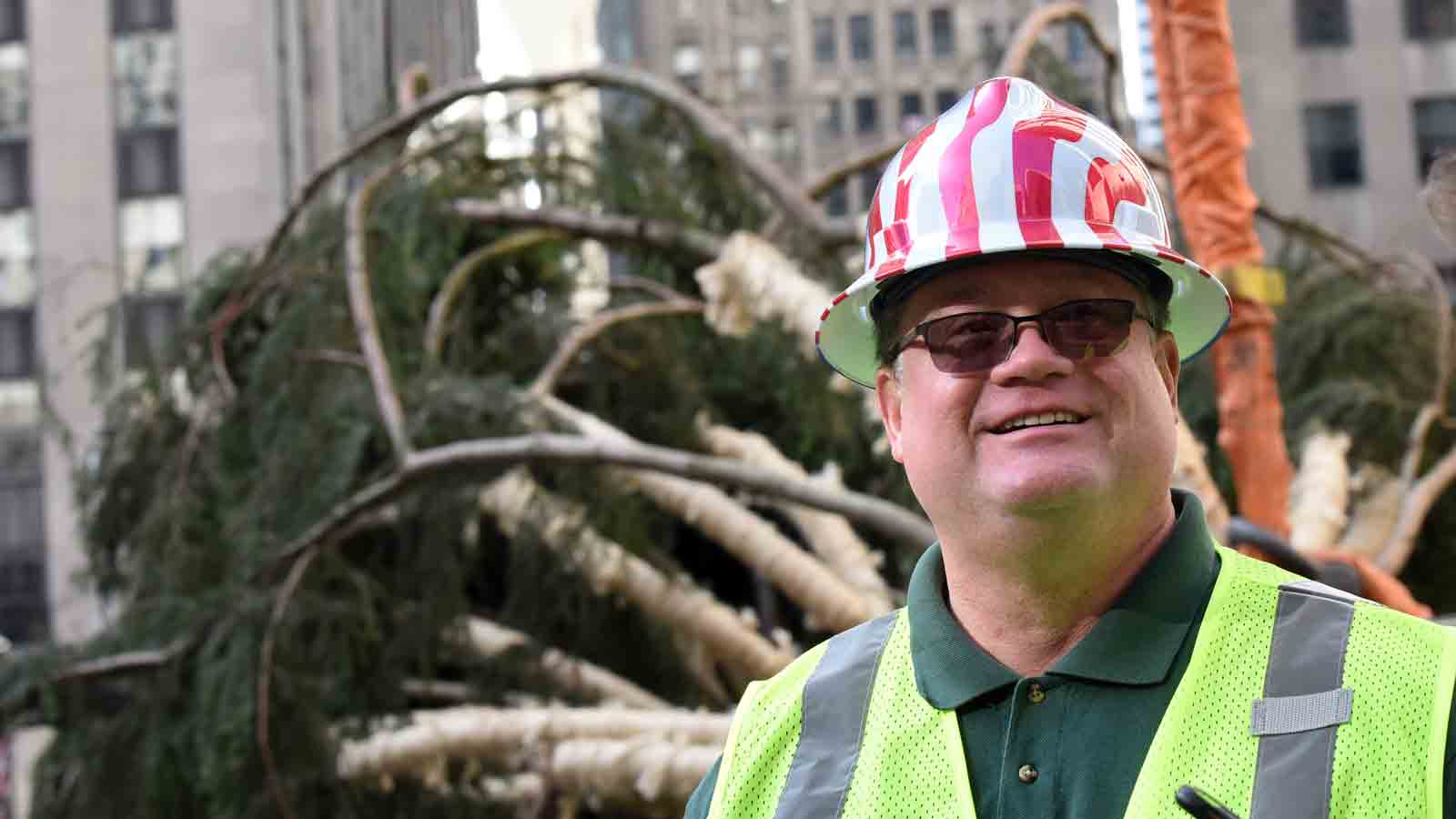
There’s only one of those jobs, kind of like Santa Claus. And it won’t be available for quite some time.
“I can’t retire,” Pauze said. “This job is too much fun.”

